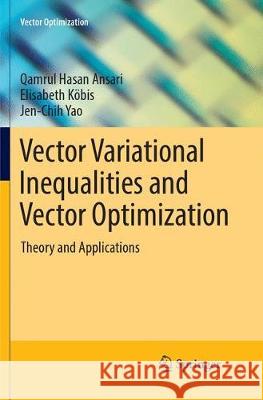Vector Variational Inequalities and Vector Optimization: Theory and Applications » książka
topmenu
Vector Variational Inequalities and Vector Optimization: Theory and Applications
ISBN-13: 9783319874623 / Angielski / Miękka / 2018 / 509 str.
Kategorie:
Kategorie BISAC:
Wydawca:
Springer
Seria wydawnicza:
Język:
Angielski
ISBN-13:
9783319874623
Rok wydania:
2018
Wydanie:
Softcover Repri
Ilość stron:
509
Oprawa:
Miękka
Wolumenów:
01











